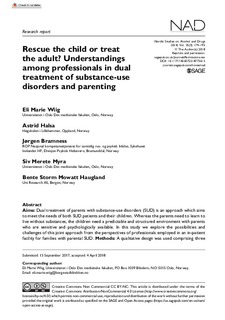| dc.contributor.author | Wiig, Eli Marie | |
| dc.contributor.author | Halsa, Astrid Dagmar | |
| dc.contributor.author | Bramness, Jørgen Gustav | |
| dc.contributor.author | Myra, Siv Merete | |
| dc.contributor.author | Haugland, Bente Storm Mowatt | |
| dc.date.accessioned | 2019-03-20T12:26:20Z | |
| dc.date.available | 2019-03-20T12:26:20Z | |
| dc.date.created | 2018-06-12T10:18:04Z | |
| dc.date.issued | 2018 | |
| dc.identifier.citation | Nordic Studies on Alcohol and Drugs. 2018, 35 (3), 179-195. | nb_NO |
| dc.identifier.issn | 1455-0725 | |
| dc.identifier.uri | http://hdl.handle.net/11250/2590836 | |
| dc.description.abstract | Aims: Dual treatment of parents with substance-use disorders (SUD) is an approach which aims
to meet the needs of both SUD patients and their children. Whereas the parents need to learn to
live without substances, the children need a predictable and structured environment with parents
who are sensitive and psychologically available. In this study we explore the possibilities and
challenges of this joint approach from the perspectives of professionals employed in an in-patient
facility for families with parental SUD. Methods: A qualitative design was used comprising three focus-group interviews with 15 professionals: two groups with ward staff and one with therapists,
all working at a family ward for parents with SUD and their children. Data were analysed using
thematic analysis. Results: Professionals faced difficulties combining the needs of parents and
children and seemed to choose to prioritise either the adult with SUD or the wellbeing of the child.
However, some professionals described what might be a third and alternative solution by supporting the mothers in everyday life, routines, and care, through exploring present moment
situations. This approach seemed to help parents become more conscious of the child, their
interaction with the child, and their own feelings. Professionals described working at the family
ward as emotionally challenging. Conclusion: Combining treatment of parental SUD, interventions to improve parenting roles and practice, and at the same time focusing on the developmental
needs of children, is experienced as a complex and demanding task. Different priorities and
treatment aims may enhance tensions between professionals. Even though professionals experience in-patient dual treatment as challenging, they believe this approach facilitates positive
development in substance dependent parents and their children. | nb_NO |
| dc.language.iso | eng | nb_NO |
| dc.relation.uri | http://journals.sagepub.com/doi/pdf/10.1177/1455072518773615 | |
| dc.rights | Navngivelse 4.0 Internasjonal | * |
| dc.rights.uri | http://creativecommons.org/licenses/by/4.0/deed.no | * |
| dc.title | Rescue the child or treat the adult? Understandings among professionals in dual treatment of substance-use disorders and parenting | nb_NO |
| dc.type | Journal article | nb_NO |
| dc.type | Peer reviewed | nb_NO |
| dc.description.version | publishedVersion | nb_NO |
| dc.source.pagenumber | 179-195 | nb_NO |
| dc.source.volume | 35 | nb_NO |
| dc.source.journal | Nordic Studies on Alcohol and Drugs | nb_NO |
| dc.source.issue | 3 | nb_NO |
| dc.identifier.doi | 10.1177/1455072518773615 | |
| dc.identifier.cristin | 1590615 | |
| cristin.unitcode | 209,4,5,0 | |
| cristin.unitname | Institutt for sosialfag og veiledning | |
| cristin.ispublished | true | |
| cristin.fulltext | original | |
| cristin.qualitycode | 1 | |

